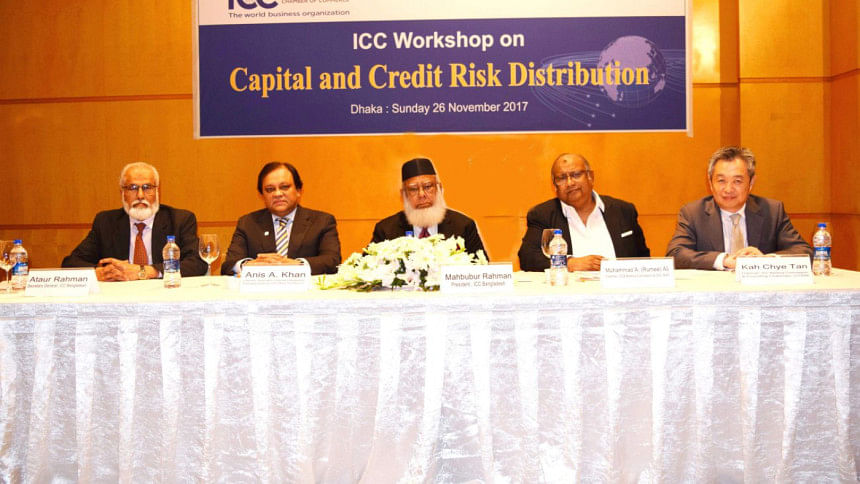Bad loans ring alarm bells for economy: ICCB

The continuous rise in bad loans is very alarming not only for the banking sector but also for the entire economy, said the International Chamber of Commerce Bangladesh.
“Because of the bad loans banks are faced with capital deficit,” said ICCB President Mahbubur Rahman at a workshop in Dhaka on Sunday.
The ICCB organised the workshop on capital and credit risk distribution.
“We have observed that the government has been providing recapitalisation funds to state banks to meet capital adequacy ratio set by the Bangladesh Bank,” said Rahman in a statement.
Quoting experts, the statement said banks do not have adequate technical expertise to properly analyse loan files.
Moreover, the defaulters are remaining out of the reach of the law because of legal complexities. “This has encouraged people to become defaulters,” Rahman said.
Non-performing loans in the banking sector, according to reports published by the BB, surged to more than Tk 80,000 crore.
The figure would have been much higher if bad loans to the tune of Tk 45,000 crore had not been written off, the statement said.
“As a result, the banks are having difficulties in providing credit to those who are good borrowers or to new entrepreneurs,” it said.
Bangladesh's journey forward to becoming a middle-income country by 2021 has created huge need for capital in the infrastructure sector, said Muhammad A Rumee Ali, ICCB's banking commission chairman, in his address.
“But because of bad loans banks are suffering from capital inadequacy,” he said, adding that managing capital is the banks' utmost important duty.
Alternative dispute resolution and mediation will be useful in cutting the bad debt of commercial banks, said Ali, also the chief executive officer of the Bangladesh International Arbitration Centre.
Global trade is moving towards digitisation so Bangladesh should prepare itself in that direction, said Anis A Khan, chairman of the Association of Bankers, Bangladesh.
“The bankers of our country must upgrade themselves using modern tools and rules. In order to become a good and efficient banker one should have working experience in trade finance,” said Khan, also the CEO of Mutual Trust Bank.
He said the Association of Bankers Bangladesh has been actively working with the central bank to develop the banking sector and create a corporate culture.
Banks are facing increasing funding costs, said Kah Chey Tan, immediate past chairman of the ICC banking commission, in his presentation.
“Securing stable and cheap funding is a challenge for banks now.”
The global trade finance gap currently stands at an estimated $1.6 trillion, so there is a substantial trade opportunity not being met by traditional sources, he added.
The ICCB statement said facilitating trade has become more expensive for banks on account of enhanced know-your-customer and anti-money laundering requirements.
A recent Thomson Reuters survey found that financial institutions are now spending an average $60 million per year on KYC procedures, with some even spending as much as $500 million.
Banks are also required to hold much higher levels of capital to meet the Basel - III requirements. This has impacted the trade business of banks.
Many banks have been forced to refocus their activities, leading to a withdrawal from certain markets. This “de-risking” has primarily impacted small and medium enterprises in developing markets in particular, with many struggling to access finance.
Some 56 percent of all SME trade finance proposals are rejected, Tan said quoting a 2016 survey by the Asian Development Bank.
A total of 118 bankers and two insurance executives took part in the workshop, which was also attended by Bank Asia CEO Md Arfan Ali and ICCB Secretary General Ataur Rahman.

 For all latest news, follow The Daily Star's Google News channel.
For all latest news, follow The Daily Star's Google News channel. 



Comments